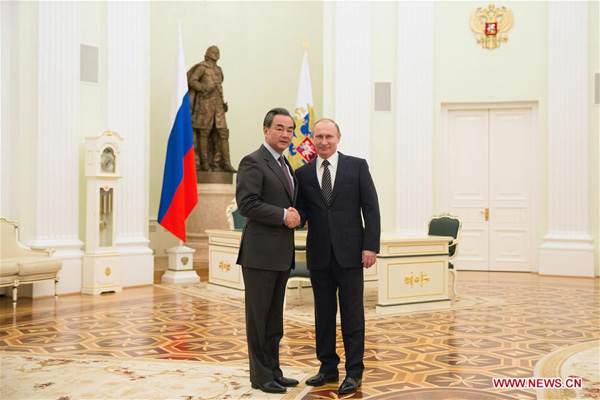Russia-China ties benefit both countries, peoples: Russian FM
Updated: 2016-04-13 03:45
(Xinhua)
|
|||||||||
 |
|
Russian President Vladimir Putin (R) shakes hands with visiting Chinese Foreign Minister Wang Yi during their meeting in Moscow, capital of Russia, on March 11, 2016. [Photo/Xinhua] |
MOSCOW -- Russian Foreign Minister Sergey Lavrov said on Tuesday that Russia-China ties are at an all-time high, and that their relationship is consistently deepened for the benefit of both countries and peoples.
Russia and China are interested in expanding cooperation and aligning the Russia-led Eurasian Economic Union (EEU) with China's Belt and Road Initiative, Lavrov said in a joint interview with Chinese, Japanese and Mongolian media on the eve of his visits to the three countries.
"Currently, an agreement on trade and economic cooperation between the EEU and China is being prepared, and a roadmap for priority integration projects is being worked out simultaneously," he said.
The top Russian diplomat also stressed the importance of regional cooperation between the two countries, especially involving Russia's Far East and China's northeastern provinces, and the Volga-Yangtze project.
While Russia and China are experiencing "some negative effects" due to a sluggish global economy, Lavrov said he believed that the decrease in Russia's trade turnover with China and other Far East neighbors was only temporary.
Moreover, Lavrov said Russia and China have showed a willingness to establish a free trade zone between the EEU and the Shanghai Cooperation Organization, an idea initiated by Russian President Vladimir Putin.
Commenting on the South China sea issue that has led to spat between China and some Southeastern Asian countries, Lavrov said the disputes should be resolved through dialogue and attempts to internationalize the issue must be stopped.
He urged external players to stop interfering in the negotiations among those involved, warning that such attempts would be "completely counterproductive."
Moreover, Lavrov also expressed concerns about the possible deployment of the Terminal High Altitude Area Defense missile system by the United States on the Korean Peninsula.
"Together with our Chinese friends, we realize that following this course will create a real threat to the security of our countries, and destabilize the strategic stability in Northeast Asia," he said.
He stressed that Russia and China recognize the right of Democratic People's Republic of Korea to use nuclear energy for peaceful purposes, but do not accept its nuclear ambitions.
Moscow and Beijing are devoted to the denuclearization of the Korean peninsula and the resumption of the six-party talks, which is "the real way to resolve the Korean Peninsula nuclear issue," he added.
Lavrov also praised the framework of the BRICS, a thriving cooperation mechanism that groups the world's five leading emerging economies -- Brazil, Russia, India, China and South Africa.
Related Stories
Russia, China concerned about possible US missile system on Korean Peninsula: FM 2016-04-12 23:40
Japan eyes upcoming FM meeting as chance to improve frayed ties with Russia 2016-04-12 16:20
Russia delivers S-300 missile systems to Iran: Russian deputy PM 2016-04-12 16:20
Bombers carry out explosions in Russia's Stavropol region 2016-04-11 16:54
China ranked as 'the second most friendly country to Russia' 2016-04-10 10:07
Today's Top News
World Bank joins AIIB on financing for joint projects
GM seeds to get oversight
Russia-China ties benefit both countries, peoples
China, UK showcase best books in London
Hello, China! Stephen Hawking debuts Weibo account
Manila set to restart revamp of airport in S China Sea
Forget cabs, now you can book plane through apps
Britain and China must join to solve steel crisis, ambassador says
Hot Topics
Lunar probe , China growth forecasts, Emission rules get tougher, China seen through 'colored lens', International board,
Editor's Picks

|

|

|

|

|

|







